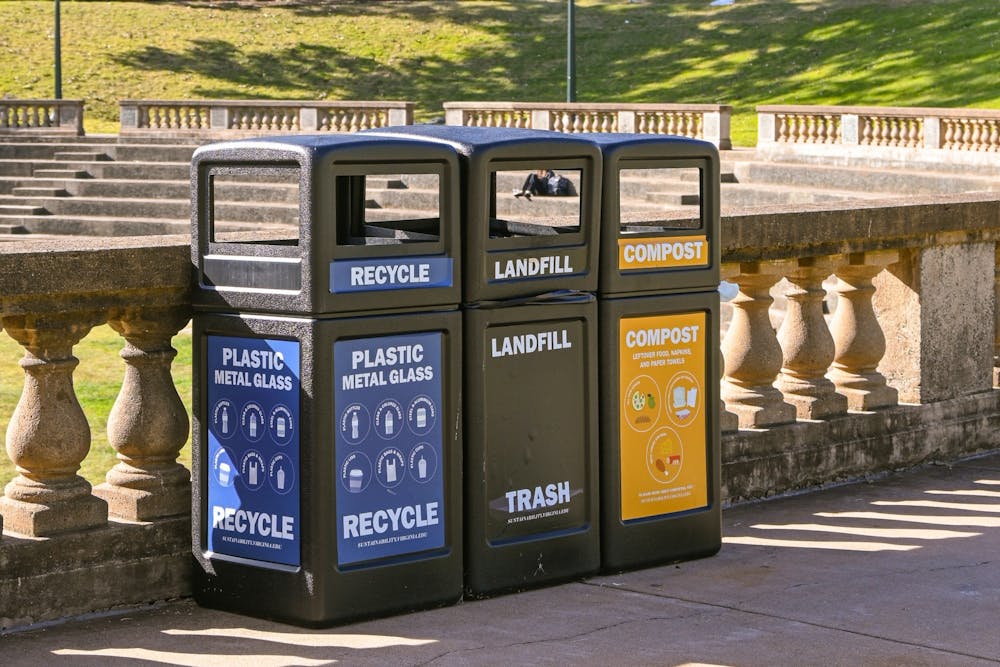In case you forgot — as some of us on the Editorial Board did — Earth Day is coming up this Saturday. This year’s theme is “Invest in Our Planet,” and University sustainability partners have taken the message to heart. For the month of April, student and Charlottesville organizations have been hosting Earth Day Every Day, a multitude of workshops, career fairs, volunteer opportunities and more designed to promote the protection of our shared environment — now, and after the date has passed. To ensure that we continue to have a habitable earth to appreciate, the University must expand their climate goals to promote ongoing environmental awareness and create citizen leaders who lead climate-conscious lives even after they graduate.
The first Earth Day was established in 1970 by the collaboration of activists, state politicians and college students. Spurred by rising national awareness of air and water pollution and their threat against human health, millions of Americans rallied in support of increasing environmental regulations. Earth Day was the catalyst for our modern environmental movement — one that, today, tackles the real and imminent concern of climate change.
While we commend the University for its ambitious Sustainability Plan to be carbon neutral by 2030 and fossil fuel free by 2050, there are steps the University should take to engage students in promoting climate resilience and sustainability on Grounds and in Charlottesville. According to a recent report from the Intergovernmental Panel on Climate Change, regional climate changes will only become more pronounced and harder to control with every increment of rising temperature. These changes are already here in Charlottesville. From extreme river heat waves to household carbon emissions higher than the national average, it is evident our community can benefit from more tangible initiatives to reduce its carbon footprint. The University has already made good progress towards a cleaner future with its Sustainability Plan — great progress, however, requires visible action and transparency, not just buzzwords.
To ensure that Earth Day is truly every day — that the climate becomes a focal point instead of an afterthought — administrators can leverage existing partnerships to incentivize climate conscious behaviors. The University already offers several opportunities for students to become educated on sustainability. For example, the University designated Morven Farm as its first Sustainability Lab last fall to expose the student body to courses on sustainability, research and even cooking classes. U.Va. Sustainability’s Earth Day events can also boost knowledge of tangible ways students can be more sustainable in their daily lives. If the University truly wants to move toward its climate goals, it must do a better job of promoting these opportunities to encourage collective, sustainable decision-making among students — and students must take a vested interest in attending and engaging in these events and opportunities.
Preserving our planet is a necessity, but it does not have to be a chore — further attempts to more effectively utilize these educational partnerships can make sustainability an instinctual practice at the University. An example of the kind of simple, yet impactful, education that we have in mind can easily be implemented within on-Grounds eating areas. Administrators could leverage the knowledge of existing sustainability partners to encourage students to reduce their food waste. The United States leaves between 125 and 160 billion pounds of food uneaten — that is 40 percent of the nation’s food supply. This means all the emissions used to produce, process, transport, prepare and store that food are wasted, too. College dining halls exacerbate this problem. Nationwide, colleges produce 22 million pounds of food waste annually. Just look inside dining hall dish returns and recycling bins at the University and one can see an inordinate amount of food thrown away.
Dining halls and on-Grounds restaurants present students with everyday opportunities to make dining decisions that reflect an awareness of the impact that our collective actions have on the environment. It does not matter if there are composting bins in every University dining location if students do not know how to use them. The University must move beyond merely creating the potential for climate conscious decisions and start actively encouraging students to make greener choices. For example, by partnering with Student Council, U.Va Dine or sustainability CIOs to create recycling guidelines and encourage students to be aware of their food waste, the University can reduce its carbon footprint one meal at a time and cultivate citizen leaders who are stewards of this planet we call home.
24 hours of climate consciousness on Earth Day is ultimately a short-term solution — 365 days of that, maybe even a lifetime, would do wonders for the planet. The end goal of a carbon neutral and fossil free future will not be the result of one stakeholder. Nevertheless, one institution — this University — has the potential to prompt individual awareness for collective climate resilience. Administrators must take advantage of their network of student leaders and organizations to partner with and educate the student body. Waiting to act will only make preserving our planet all the more difficult — let’s make this planet we call home liveable in the long run by finding ways to ensure that each of us commits to Earth Day every day.
The Cavalier Daily Editorial Board is composed of the Executive Editor, the Editor-in-Chief, the two Opinion Editors, their Senior Associates and an Opinion Columnist. The board can be reached at eb@cavalierdaily.com







